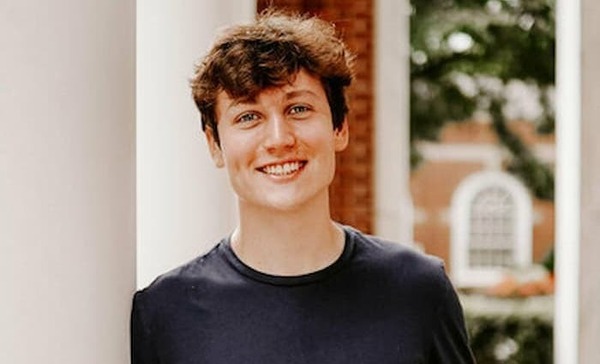
Students with any major can conduct undergraduate research at Notre Dame; many choose to do so in the summer.
Some work in labs, some partner with professors for special projects, and others travel throughout the United States and the world.
Meet Daniel O'Brien, who is working with ancient manuscripts with David Lincicum, associate professor of theology.
Daniel O'Brien '24
Majors: Philosophy, Theology, and Classics supplemental major with concentration in Greek
What I Do:
I am currently working with Professor David Lincicum on a project concerning the Epistle of Barnabas, a non-canonical Christian work written roughly between 70 and 132 AD.
Specifically, I assist with the manuscript collation, the process of comparing differing manuscripts or editions of the same work in order to establish a corrected text. This process is instrumental in turning the raw data of various manuscripts into a single text to be utilized, while still noting the idiosyncrasies and variants the different manuscripts bring to the table.
I am also working on analyzing the many “scriptural” quotations found in the work, some of which vary distinctly from the “standard” texts they purport to quote and others of which are utterly mysterious in origin.
One lurking question asks to what extent the author of the work is deliberately altering or even generating quotations to fit his uses, or if he is quoting from variant or unknown sources. Another section of my research pertains to how other writers contemporary to the Epistle of Barnabas cite and exegete these same sources, in order to ascertain the epistle’s place in post-temple Judaism and early Christianity.
Why I Decided to Do Research this Summer:
I have had a sustained interest in early Christianity since high school, an interest that has grown at Notre Dame, fostered by our excellent faculty and resources across many departments; after graduation, I intend to attend graduate school and eventually pursue a Ph.D. in this field.
Setting aside part of my summer for research allows me to focus specifically on research, acquiring skills first-hand that will help me in my academic career and pursuing a topic I find fascinating.
How I Got Started:
This past semester, I took New Testament Introduction with Professor Lincicum, and became particularly interested with the world of the New Testament—particularly, early non-canonical Christian works, those that “didn’t make the cut.” Fortunately, Professor Lincicum himself mentioned that he was engaged in research concerning one such work, the Epistle of Barnabas, and I asked if I could work as his research assistant on this project during the summer.
What I’m Learning So Far:
Research takes time, but is rewarding—I have begun the manuscript collation process, and looking back upon pages of completed collation is a satisfying feeling. I am particularly glad I am able to do research in the summer, with fewer distractions from schoolwork and extracurriculars while having the same resources available to me, particularly those available through the Hesburgh Library.
Personally, this research has highlighted a dimension of my field to which I had previously not given enough thought—the countless hands throughout the centuries who laboriously hand-copied manuscripts for their preservation, a particularly impressive feat for those copying non-canonical works. The idiosyncrasies of Greek handwriting is a world I had not been exposed to before, and being able to read it is a unique experience, not to mention a very important skill to have in my field. Being able to examine and consider the very handwriting of these scribes, instead of typed text on a page, has been a fascinating experience, and I am looking forward to continuing this research for the rest of the summer.
To learn more about research, visit the College of Arts and Letters.
Originally published by at admissions.nd.edu June 27, 2022.